By Jack McDonough, 2021 prospective JET
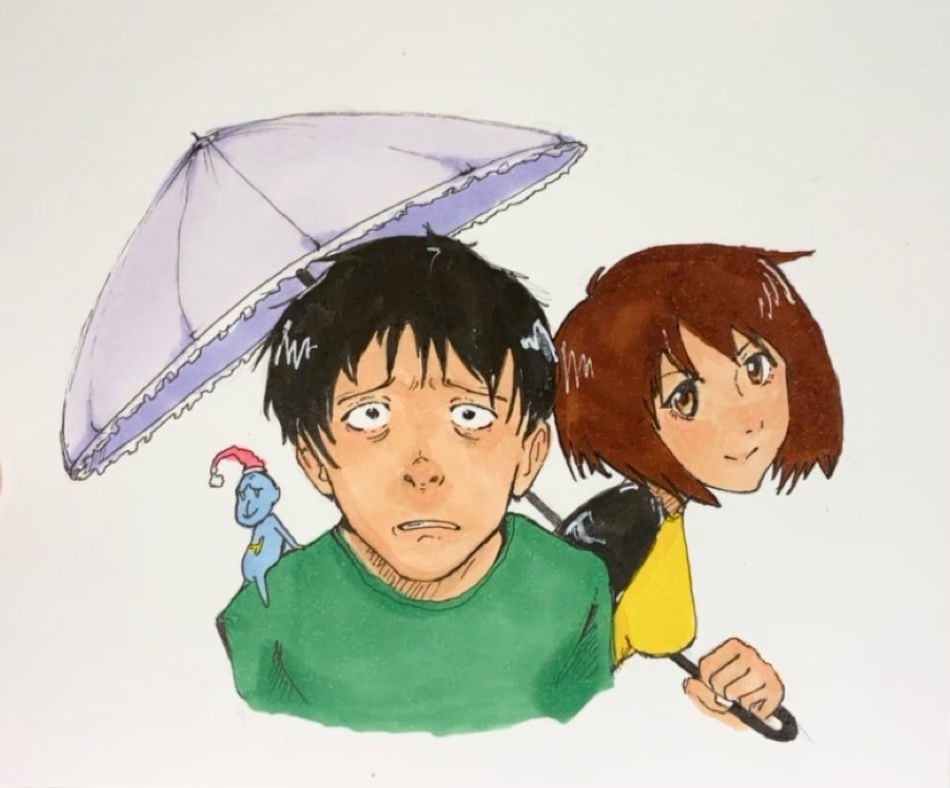
Most anime feature protagonists who are special: characters who are brave, strong, or brilliant; think Light Yagami from Death Note or Goku from Dragon Ball. These characters either inspire you or have incredibly enviable traits. Welcome to the N.H.K. does not have a special character: no knight in shining armor, no undefeatable hero. This anime’s main character is lazy, pathetic, and cringy: Tatsuhiro Sato, a man who thinks he is being controlled through his TV by the Nihon Hikikomori Kyokai, the Japanese Hikikomori Organization, a play on the real-life Nippon Hoso Kyokai, the Japanese Broadcasting Corporation.
Welcome to the N.H.K. is an anime adaptation of the light novel N.H.K. ni Yōkoso! by Tasuhiko Takimoto, featuring Tatsuhiro Sato, a self-proclaimed hikikomori, meaning recluse: hikikomori do not work or attend school, do not have a diagnosed mental disorder, and have been at home for six months or longer without interacting with people other than their family. Sato also calls himself a NEET: “Not in Education, Employment, or Training.” He moved to Tokyo from Hokkaido to attend university, but experienced a panic attack and dropped out of school. He binges television all day, receiving an allowance from his parents; however, the allowance shrinks throughout the show due to his father being fired from work.
Sato is surrounded by a cast of characters who all have issues: Kaoru Yamazaki, an otaku who shirks his responsibilities in Hokkaido to create video games in Tokyo; Hitomi Kashiwa, a female office worker who is depressed and obsessed with conspiracies; and Misaki Nakahara, a broken girl who is searching for someone more pathetic than herself to cling on to.
The relationships between Sato and the rest of the cast are dysfunctional and self-serving. Hitomi uses Sato to talk about her conspiracy theories in hopes that he will care about her and alleviate her depression, while Sato tries to rekindle the physical relationship he had with her in high school. Kaoru uses Sato to help him create a video game so that he can prove his escape to Tokyo was not in vain, while Sato plans to show their game to Misaki so that he can prove he isn’t a total loser. Misaki needs Sato to prove to herself that there is someone more pathetic than she is, while Sato relies on a bevy of services Misaki provides him, e.g. buying groceries, preparing his meals, cleaning his apartment: essentially keeping him alive. Welcome to the N.H.K. is adept at portraying the complexity of its characters and relationships, and you’ll find yourself alternately rooting for and cursing at the cast in between scenes.
Welcome to the N.H.K. will make you laugh and feel empty at the same time; you’ll find Sato’s inability to function hilarious and cringy, all while a creeping sadness envelopes you throughout the show. The emotion of the show is bolstered by the soundtrack which oscillates between screamo tracks when Sato is having a breakdown and slow, smooth guitar and synth tracks when Hitomi or Misaki are reaching out to Sato for comfort. Every element of this show just works to create a unique experience that you won’t get from any other anime: you just have to go watch and discover it for yourself.
Writing this recommendation has been extremely difficult and I finally realize why: Welcome to the N.H.K. isn’t a TV show, it’s a sleight of hand trick. It’s a trick done right in front of your eyes, in slow-motion, and you still can’t tell how the trick is done. N.H.K. is a depressing show about hope: the hope to persevere even in the face of hopelessness. What you’ll find is that Hitomi, Kaoru, Misaki, and even Sato, are regular people: they’ve just experienced one too many little tragedies and need help to get back on their feet. At its conclusion, N.H.K. will give you the hope that you need to continue on: not the hope that things will get better, but that things can get better if you treat yourself and others with dignity and compassion. Protagonists in other anime either have god-like powers or unhealthy habits that are excused because they are the main character, but not Sato. Sato is a great protagonist because he has no powers; he doesn’t have a free pass to be a misanthrope; he is forced to live a life with consequences, just like you and me. Welcome to the N.H.K is a show that will bring you back down to earth: once you’re down there, sulk for a moment, then get back up again.
Japan Insights—Experiencing Edo Culture Near Tokyo
By Makoto Shirai, secretary, Japan-Insights Research Institute (Non-profit organization in Tokyo)

Dear Friends,
Are you interested in Edo Culture?
Let me introduce an essay from Japan-Insights archives.
The seventh one is on Mt. Oyama Pilgrimage by Mrs. Alice Gordenker.
https://topics.japan-insights.jp/Public/pdf/japan-insights_jp/topics/JIN_OyamaPilgrimage.pdf
Please share this expert’s experience!
Japan-Insights is a nonprofit open database compiled by leading experts in Japanese studies. The posts present a broad range of historical and contemporary topics that encourage visitors to engage with the real Japan through immersive experiences. Follow the Facebook page and website to learn about and share these insights from around the country!”
#japan #japaneseculture
Sailor Moon: How These Magical Girls Transformed Our World
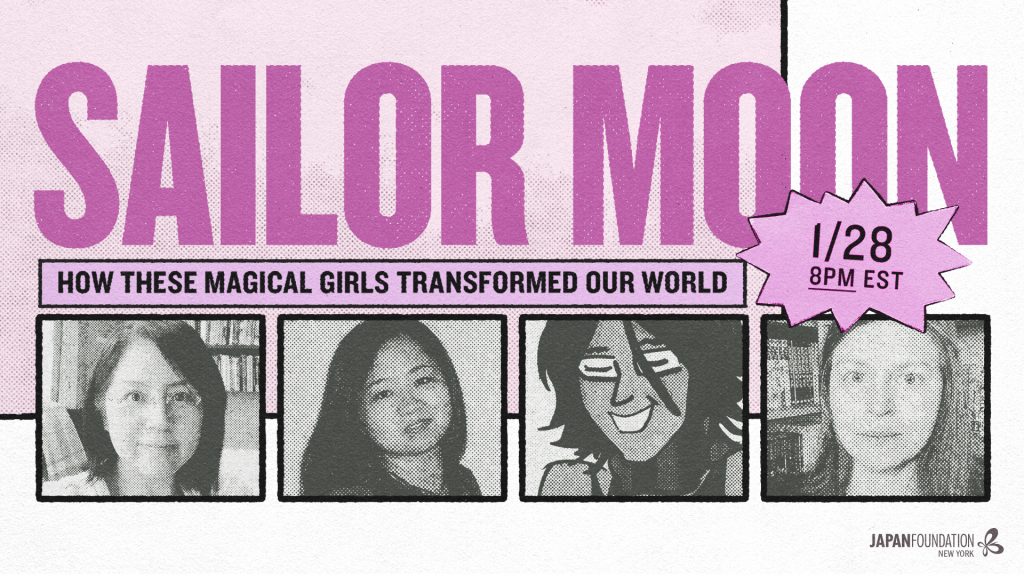
Sailor Moon: How These Magical Girls Transformed Our World
Thursday, January 28, 8PM (EST)
About this Event
Can you believe that it’s been almost 30 years since Sailor Moon was first published in the weekly girl’s manga magazine Nakayoshi in 1992?! The manga and its animation adaptation quickly broke records and became a milestone of ’90s girls’ manga and anime. Sailor Moon next turned into a social phenomenon by reaching far beyond the boundaries of its genre, gaining widespread popularity among adults as well as children, and appealing to all genders and sexual orientations. Then, as it started being exported to other parts of the world, it became many people’s first introduction to Japanese pop culture.
Why was Sailor Moon such a hit when it first appeared, and why is it still so popular today? What led to Sailor Moon‘s rise outside of Japan, and what impact did it have on the generation that grew up with it?
Come join our panel discussion with Kumiko Saito, Mari Morimoto, Samantha Close and Kathryn Hemmann as they explore the history and legacy of Sailor Moon, as well as the fandom and fan culture it helped create in the U.S.
Twitter: https://twitter.com/JF_NewYork/status/1348738956381151234
JETwit’s JET Alum Movers & Shakers: Dr. Mary J. Eberhardinger, Hyogo-ken (2008-2010)
************
JETwit’s JET Alum Movers & Shakers is produced by Ryan Hata (Tottori-ken, 2014-2017), Margie Banin (Kochi-ken, 2005-2007), and Jim Walsh (Fukushima-ken, 2018-2020). Want to be featured next? Submit your information here.

Accomplishment:
Book
More Information:
https://rowman.com/ISBN/9781793639325/A-Rhetoric-and-Philosophy-of-Gifts
https://usjetaa.org/jets-on-japan-forum-issue-no-1/
I’ve lived in Baltimore, Boston, Charlotte, Greensboro, Osaka, Pittsburgh, Singapore, Slippery Rock, and Tanba. I am passionate about having conversations with aspiring JETs, those who wish to pursue graduate or doctoral study, or otherwise. Let’s connect!
Public Information:
LinkedIn: https://www.linkedin.com/in/mary-j-eberhardinger-ph-d-91968527/
Japan Insights—Enjoy Sites and Sights in Edo Period
By Makoto Shirai, secretary, Japan-Insights Research Institute (Non-profit organization in Tokyo)

Courtesy of National Museum of Japanese History
Dear Friends,
Have you looked at Japan from Edo period?
Let me introduce an essay from Japan-Insights archives.
The sixth one is on Samurai Art of Edo period (1603-1867) by Dr. Timon Screech.
https://topics.japan-insights.jp/Public/pdf/japan-insights_jp/topics/JIN_EdoArtAndCulture.pdf
Please share this expert’s experience!
Japan-Insights is a nonprofit open database compiled by leading experts in Japanese studies. The posts present a broad range of historical and contemporary topics that encourage visitors to engage with the real Japan through immersive experiences. Follow the Facebook page and website to learn about and share these insights from around the country!”
#japan #japaneseculture
WIT Life #349: 今年の漢字
Interpreter/Translator/Writer Stacy Smith (Kumamoto-ken CIR, 2000-03) presents WIT Life, a periodic series about aspects of Japanese culture such as art, film, food and language. Stacy starts her day by watching Fujisankei’s newscast in Japanese, and here she offers some interesting tidbits and trends along with her own observations.
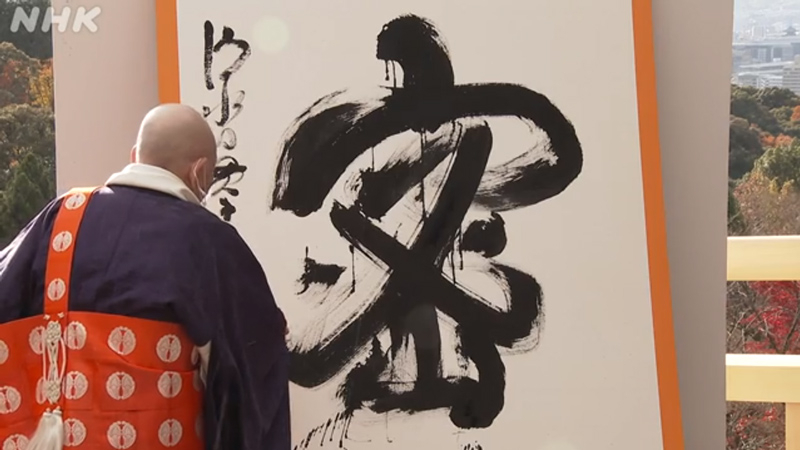
We have come to the end of this crazy Covid year, and that means it’s time for 今年の漢字 (kotoshi no kanji, or kanji of the year). 密 (mitsu, or close, dense and crowded) was selected, reflecting Japan’s initial response to the virus by promoting avoidance of 三つの密 (mitsu no mitsu or sanmitsu). These are also known as the 3Cs, and refer to 密閉 (mippei, or confined, poorly ventilated spaces), 密集 (misshuu, or crowds of people) and 密接 (missetsu, or close-contact settings). Japan was able to control infection rates to an extent this way, but as in the U.S. there are worries of a surge early next year as a result of gathering during the 年末年始 (nenmatsu nenshi, or year-end holidays). Runners-up to 密 included 禍 (ka, or damage, as in コロナ禍) and 病 (byou or yamai, or disease and illness).
Read MoreUSJETAA Webinar – Making your Own Luck after JET

On Tuesday, December 15th, USJETAA hosted its last webinar of 2020 and it featured JETwit’s own, Steven Horowitz (Aichi-ken, 1992-1994) along with Mya Fisher (Kanagawa-ken, 2000-2002), and Kristy Ishii (Gunma-ken, 2016-2018). Each JET alumni spoke about building connections, networking, being proactive, trying something new, and ultimately “making your own luck after JET.” If you missed the webinar, you can view it here.
For other fantastic webinars, sign up for USJETAA here. It’s free to JET alumni!
JQ Magazine: Book Review — ‘No Pianos, Pets or Foreigners!: My Life in Japan in the ’80s’
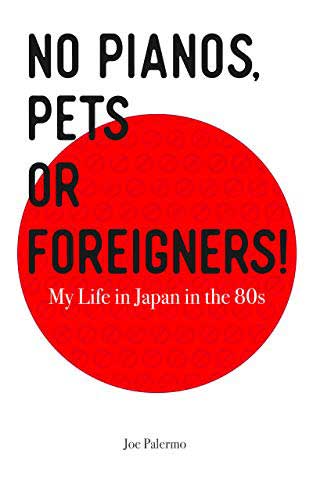
By Rashaad Jorden (Yamagata–ken, 2008-10; Kochi-ken, 2018-2020) for JQ magazine. A former head of JETAA Philadelphia’s Sub–Chapter, Rashaad is a graduate of Leeds Beckett University with a master’s degree in responsible tourism management. For more on his life abroad and enthusiasm for taiko drumming, visit his blog at www.gettingpounded.wordpress.com.
Before the advent of the JET Program, there were Westerners who taught English in Japan. Joe Palermo was one of them, and he tells his story in No Pianos, Pets or Foreigners!: My Life in Japan in the ’80s.
Palermo arrived in Gunma Prefecture in 1982 as a Mombusho English Fellow (a precursor to modern-day JETs) and his book—whose title was inspired by a phrase he often saw in ads while looking for an apartment—is obviously a walk down memory lane, as well as a collection of “what I did in Japan” stories.
The book could best be described as a score of tales best told over a beer or two (like when he realized he left his shoes in a supermarket parking lot during heavy rain). Some of the anecdotes Palermo shares are products of their time, such as his self-introduction to students, “I am E.T.: English Teacher.” Much of No Pianos, Pets or Foreigners contains tidbits that might really only interest Palermo’s close friends (like the appearance of his house). However, the author excels with his observations of life in Japan, such as illuminating things you may not have been aware of or had totally forgotten, like the tendency of Japanese to rarely go to the dentist.
Read MoreMaking Your Own Luck After JET

Join USJETAA and JETwit’s own, Steven Horowitz along with Mya Fisher & Kristy Ishii for a discussion on making your own luck after JET. They will cover how you can be proactive after JET in finding your next big opportunity. Our speakers will share their own journeys after JET and how they have utilized the JET alumni community to kickstart their careers. The speakers are all at different stages in their careers and have great advice to offer. This webinar will give everyone ways to start connecting and getting involved in the JET alumni community.
December 15, 2020
5 PM PT / 8 PM ET (10 AM Japan time on 12/16)
Register here: https://bit.ly/luckafterjet
Attack on Titan Returns
By Jack McDonough, 2021 prospective JET
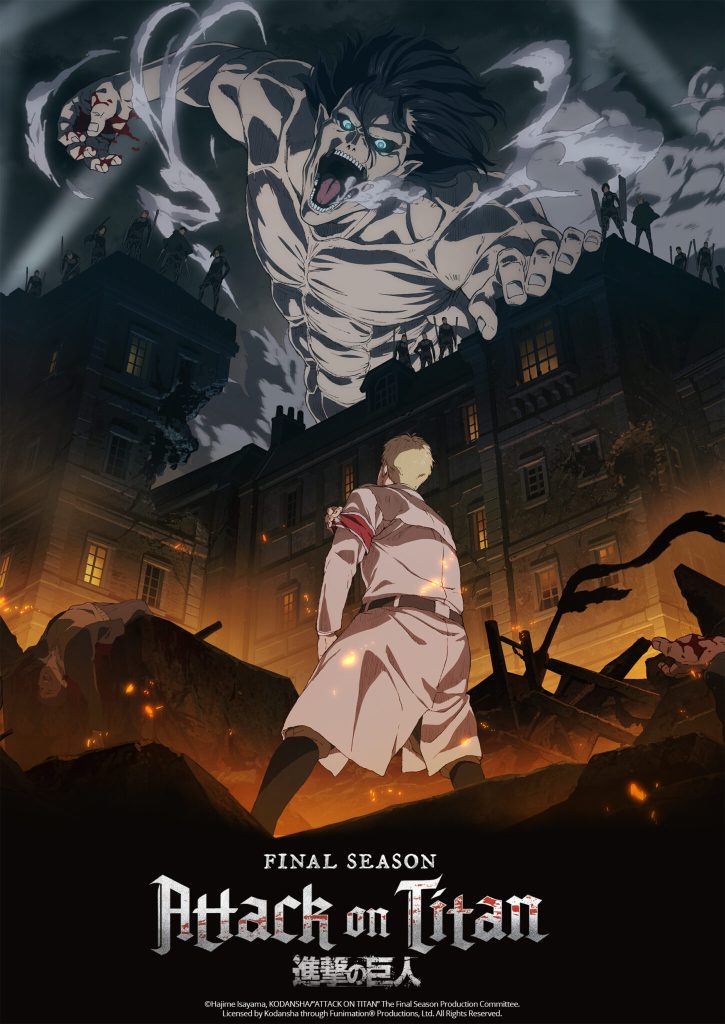
Let’s talk: 2020 has been rough. From Corona Virus to the economic downturn, this year has gone on too long for my liking. For me, and many others, December is a time that is remembered fondly; it’s a break from the monotony of regular life with wassailing, hall-decking, and merry-making. 2020 needs an injection of ‘‘ ’Tis the season” and luckily, for anime fans, we got just that. I’m not talking about Christmas; I’m talking about Attack on Titan.
Attack on Titan originally aired in April of 2013 and is based on the manga Shingeki no Kyojin by Hajime Isyama; it’s one of the most popular manga to ever be released. The first three seasons of the show were produced by Wit Studios and the current season is animated by MAPPA Studios. The anime follows Eren Yeager’s quest for revenge against the human-eating giants that killed his mother and destroyed his hometown… or at least that’s what it used to be about. My first time watching, I asked a series of questions: “Why are there Titans eating people, why are there giant walls protecting humanity, and how can mankind ever defeat these monsters?” The characters in the show ask themselves those same questions; the story is really a mystery, where the characters know nothing of the giants assailing them, or the cruel world they inhabit. The viewer never knows more than the characters, for the most part, and the viewer and the characters unravel the mysteries together. The “plot twists” in Attack are unparalleled and take the story from a simple “humans versus monsters” story into something much more dynamic and all-consuming. This, combined with excellent animation, great voice-acting, and an epic soundtrack, creates a fantastic experience.
Attack on Titan: The Final Season couldn’t have come sooner. The first episode of the season, “The Other Side of the Sea,” was action-packed and conveyed that this season would be the most intense one yet. The new animation by MAPPA does justice to the series. Watching the first episode felt like when the pieces of a jigsaw puzzle finally come together: the mysteries of the world have been unraveled, and all that’s left is to watch and see how Isyama’s characters will react to the truths he has revealed.
I used to say that Attack on Titan was the anime equivalent of Game of Thrones, but this characterization is wrong. While it’s easy to convey the shared dark-fantasy theme between Attack and Game of Thrones, Attack on Titan is so much more than that now: its political, violent, mystifying, and epic. Attack on Titan isn’t just a great anime or a great show, it’s one of the best stories ever told. If you haven’t watched it and you’re a fan of anime, watch it. If you haven’t watched it and you’re not a fan of anime, watch it. Attack on Titan transcends genre and medium and is a must-watch, and it’s all I want for Christmas this year.
Post COVID-19: Rebuilding Sustainable Business Community Through Sister Cities

As part of the ongoing bilateral forum series U.S.-Japan Subnational Global Young Professionals Forum,we are pleased to invite you to attend as an observer to the City of Honolulu and City of Hiroshima Young Professional Forum, internationally organized by the Koyamada International Foundation (KIF) America, KIF Japan and Junior Chamber International (JCI) Japan andlocally hosted by the JCI Hawaii, JCI Honolulu, JCI Hiroshima, Japan-America Society of Hawaii.
TOPIC:Post COVID-19: Rebuilding Sustainable Business Community Through Sister Cities
WHEN:HST:2pm-4pm on Monday, December 14thPST: 4pm-6pm on Monday, December 14thEST: 7pm-9pm on Monday, December 14thJST: 9am-11am on Tuesday, December 15th
WHERE: The Forum will be held privately by the Zoom Meeting platform with its interpretation option.
HOW: To register, please click this link – http://kifusa.org/register/ypf and you will be given a Zoom link to attend the forum once your registration is completed.
WHO:
Welcoming remarks
- United States Congressman Ted Lieu (a bipartisan bill “City and State Diplomacy Act”)
- United States Consulate General Osaka Richard Mei
- Mayor of Honolulu Kirk Caldwell
- Mayor of Hiroshima Kazumi Matsui
- Hollywood celebrity Shin Koyamada (movies from “The Last Samurai” and Disney Channel’s “Wendy Wu Homecoming Warrior”)
- Japan-America Society of Hawaii Reyna Kaneko
- Junior Chamber International Japan
American Speakers
- Ms. Delle Tanioka – Senior Account Manager for Automated Healthcare Solutions (AHCS), President of JCI Hawaii 2020
- Mr. Cosmo Hirai – Bishop of Todaiji Hawaii, Vice President of International Development of JCI Honolulu 2020
- Ms. Natalie Millon – State Board member as Community Development of JCI Hawaii
- Mr. Trung Lam – Co-Owner of La Tour Cafe and La Tour Bakehouse, Lifetime Member of JCI Hawaii
- Mr. Tyler Hiranaka – Business Owner, 2018 State President of JCI Hawaii
Japanese Speakers
- Mr. Ryo Sugikawa – Director of Daiichi Building Service Co., Ltd, 2021 President of JCI Hiroshima (Japan),
- Mr. Kazuyoshi Shibuya – Director of Shibuya Co., Ltd, 2021 Permanent member JCI Hiroshima (Japan),
- Mr. Hideki Hayashi – President & CEO of Yamasaki Honsha, Ltd., Chairman of Planning the Next Era City Committee of JCI Hiroshima,
- Ms. Hiromi Ikeda – Waseda Shrine, Chief Priest, 2021 Vice Chairman of the Regular Meeting Committee of JCI Hiroshima (Japan),
- Mr. Hiroshi Michiue – JTB Corp. Competent, 2021 Designing the Next Era Peace Committee of JCI Hiroshima (Japan),
WHAT: In the beginning of the Forum, elected official and city officials, organizers and special guests will provide brief remarks, welcoming messages and their city’s video presentations. During the forum discussion, each of five wonderful American young professional speakers from Hawaii and five Japanese young professional speakers from Hiroshima will briefly introduce themselves and then exchange dialogue and share their views and personal experiences and stories in response to ten questions prepared by both cities on “Post COVID-19: Rebuilding Sustainable Business Community Through Sister Cities”. In this initial forum series, the Forum has paired six different U.S. and Japanese cities to host forums highlighting American and Japanese young professional speakers from their respective cities. The first Forum was officially launched with the City of San Jose, CA and City of Okayama, Japan. The second installment was executed with the City of San Antonio, TX and City of Kumamoto, Japan. This Honolulu-Hiroshima Forum will be our third installment one.
ABOUT USA-JAPAN SUBNATIONAL GLOBAL YOUNG PROFESSIONALS FORUMAs part of Subnational X Initiative of the Koyamada International Foundation (KIF), the Forumis a public-private partnership (PPP) in a forum series held virtually and organized internationally by the KIF America, KIF Japan, and Junior Chamber International (JCI) Japan in partnership with American and Japanese subnational governments, business organizations and sister cities organizations. The purpose of the forum is for American and Japanese young professional leaders to deepen bilateral economic and cultural people-to-people relationships to foster mutual understanding, as well as to create an international cooperation between communities in the United States and Japan at a subnational level. The final report of the Forum will be presented by JCI Japan as a bilateral recommendation to the United States-Japan Conference on Cultural and Educational Interchange (CULCON) in Japan, which will ultimately present it to the Prime Minister of Japan.
What’s Next?The next forum will be the Omaha – Shizuoka Forum at the end of January.
Interested in hosting your forum with us for your city and Japanese city?Please contact Mike Holland, a board member of KIF Japan at holland@kifjapan.org to give you more information!.
Mask Up 2020

The Japan Foundation, New York (JF) and The Japan Foundation Center for Global Partnership (CGP) has launched “Mask Up 2020,” an original face mask design contest open to all U.S.-residing amateur artists – from children to adults – and participation is free. Winning designs will be printed on masks, winners will receive 25 masks; the rest will be distributed. Winners will be announced during a live event on our YouTube channel. For more details: https://cgp.org/news201201
Here is a brief outline of the contest:
- Deadline: Friday, January 22, 2021 by 6:00pm (EST)
- Voting: February 8-17, 2021
- Winners announced: March 1, 2021
Submissions Now Open for JETs on Japan Forum
Thanks to USJETAA’s Executive Director and JET alumna, Bahia Simons-Lane (Gunma-ken, 2005-2007) for passing along this fantastic opportunity!
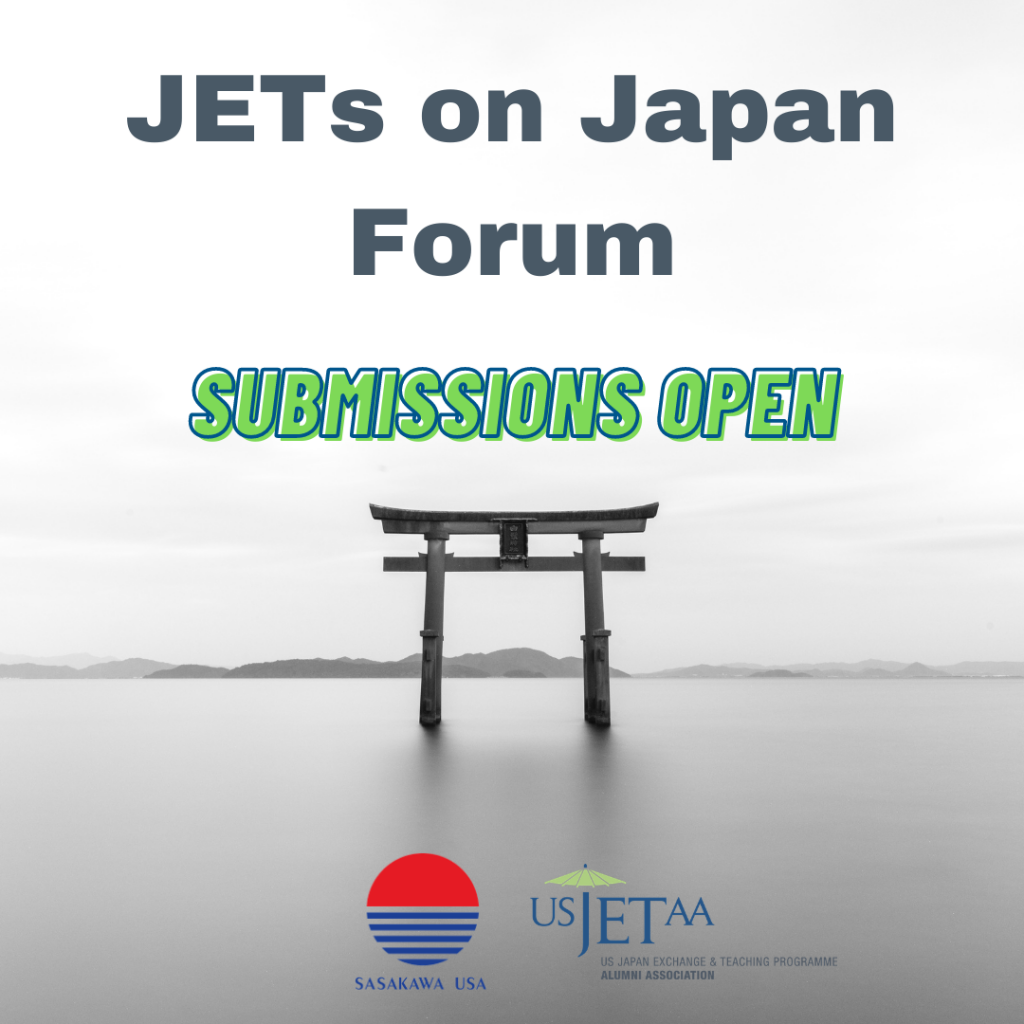
JETs on Japan Forum
Submissions are open for article abstracts for the JETs on Japan Forum. The forum is a new partnership between USJETAA and Sasakawa Peace Foundation USA (Sasakawa USA). It will feature selected articles of JET alumni perspectives on U.S.-Japan relations and provides a platform for JET alumni to contribute to deeper understanding of U.S.-Japan relations from their fields.
Authors will receive an honorarium of between $250 and $500 (depending on word length, amount of research, etc.) from USJETAA upon the article’s publication.
Submissions are encouraged from mid-to-senior level professionals who are established in the current fields OR current/recent graduate degree students in both masters and doctoral programs. Submissions should provide in-depth commentary or analysis from the JET alumni perspective of political, economic, or diplomatic ties between the United States and Japan. It should highlight the positive impacts of U.S.-Japan relations on both U.S. and Japanese communities.
Interested authors should submit an abstract of up to 300 words on your proposed topic, your bio, and a writing sample to USJETAA via email to director@usjetaa.org, Subject: JETs on Japan. Abstracts will be accepted until February 1, 2021 and articles are published on a rolling basis from now until the end of February. More info at https://bit.ly/JETsonJapan
Japan Insights—The Gardens and Landscape of Tohoku
*********By Makoto Shirai, secretary, Japan-Insights Research Institute (Non-profit organization in Tokyo)

Dear Friends,
Have you visited the gardens in Tohoku?
Let me introduce an essay from Japan-Insights archives.
The fifth one is on the gardens and landscape of Tohoku by Fran and Jake of KEW.
https://doc.japan-insights.jp/pdf/JIN_TOPIC_20200511153448.pdf
Please share this expert’s experience!
Japan-Insights is a nonprofit open database compiled by leading experts in Japanese studies. The posts present a broad range of historical and contemporary topics that encourage visitors to engage with the real Japan through immersive experiences. Follow the Facebook page and website to learn about and share these insights from around the country!”
#japan #japaneseculture #tohoku
United States National Language Teacher of the Year: Elena Kamenetzky (Aichi-ken, 2006-2009)
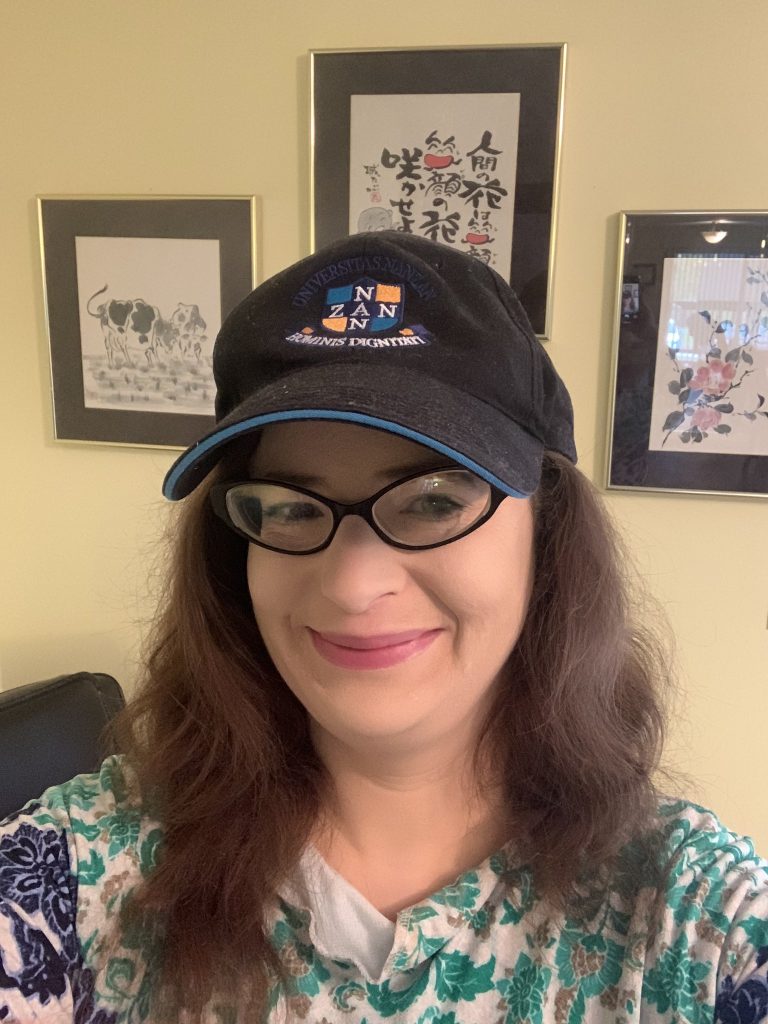
Congratulations to JET alumna, Elena Kamenetzky for winning the United States National Language Teacher of the Year award! Elena was an ALT at two middle schools in Aichi-ken from 2006-2009. She is currently a Japanese teacher at Eastern High School in Louisville, KY. Read more about Elena’s accomplishment here.

